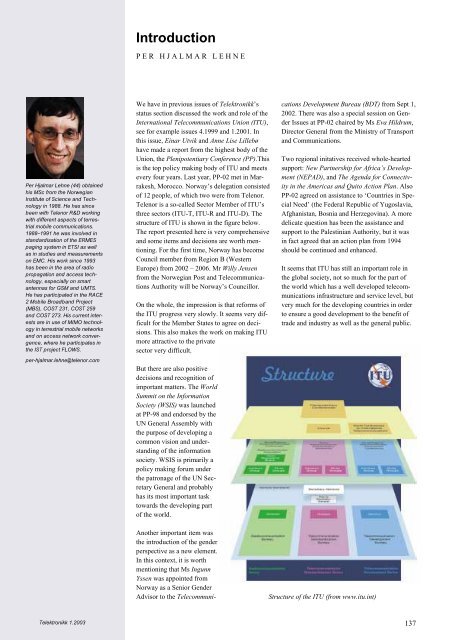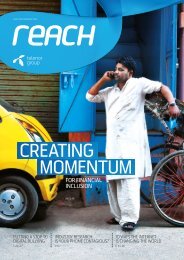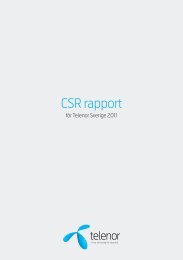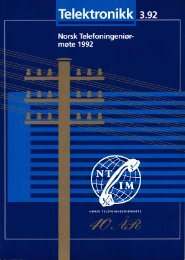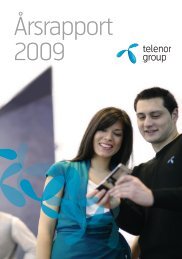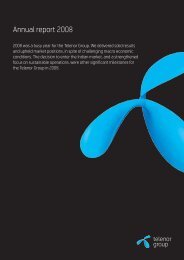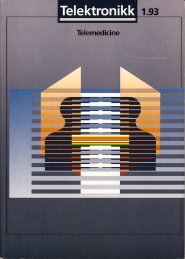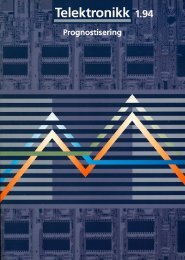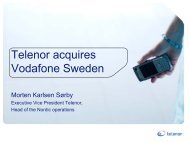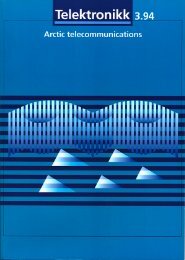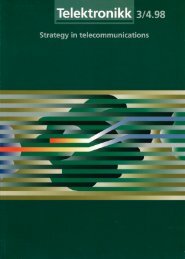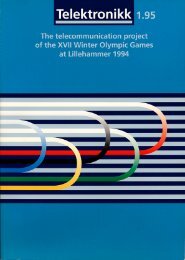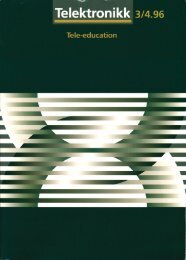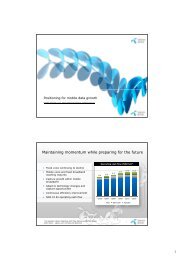Intelligent Transport Systems - Telenor
Intelligent Transport Systems - Telenor
Intelligent Transport Systems - Telenor
Create successful ePaper yourself
Turn your PDF publications into a flip-book with our unique Google optimized e-Paper software.
Per Hjalmar Lehne (44) obtained<br />
his MSc from the Norwegian<br />
Institute of Science and Technology<br />
in 1988. He has since<br />
been with <strong>Telenor</strong> R&D working<br />
with different aspects of terrestrial<br />
mobile communications.<br />
1988–1991 he was involved in<br />
standardisation of the ERMES<br />
paging system in ETSI as well<br />
as in studies and measurements<br />
on EMC. His work since 1993<br />
has been in the area of radio<br />
propagation and access technology,<br />
especially on smart<br />
antennas for GSM and UMTS.<br />
He has participated in the RACE<br />
2 Mobile Broadband Project<br />
(MBS), COST 231, COST 259<br />
and COST 273. His current interests<br />
are in use of MIMO technology<br />
in terrestrial mobile networks<br />
and on access network convergence,<br />
where he participates in<br />
the IST project FLOWS.<br />
per-hjalmar.lehne@telenor.com<br />
Telektronikk 1.2003<br />
Introduction<br />
PER HJALMAR LEHNE<br />
We have in previous issues of Telektronikk’s<br />
status section discussed the work and role of the<br />
International Telecommunications Union (ITU),<br />
see for example issues 4.1999 and 1.2001. In<br />
this issue, Einar Utvik and Anne Lise Lillebø<br />
have made a report from the highest body of the<br />
Union, the Plenipotentiary Conference (PP).This<br />
is the top policy making body of ITU and meets<br />
every four years. Last year, PP-02 met in Marrakesh,<br />
Morocco. Norway’s delegation consisted<br />
of 12 people, of which two were from <strong>Telenor</strong>.<br />
<strong>Telenor</strong> is a so-called Sector Member of ITU’s<br />
three sectors (ITU-T, ITU-R and ITU-D). The<br />
structure of ITU is shown in the figure below.<br />
The report presented here is very comprehensive<br />
and some items and decisions are worth mentioning.<br />
For the first time, Norway has become<br />
Council member from Region B (Western<br />
Europe) from 2002 – 2006. Mr Willy Jensen<br />
from the Norwegian Post and Telecommunications<br />
Authority will be Norway’s Councillor.<br />
On the whole, the impression is that reforms of<br />
the ITU progress very slowly. It seems very difficult<br />
for the Member States to agree on decisions.<br />
This also makes the work on making ITU<br />
more attractive to the private<br />
sector very difficult.<br />
But there are also positive<br />
decisions and recognition of<br />
important matters. The World<br />
Summit on the Information<br />
Society (WSIS) was launched<br />
at PP-98 and endorsed by the<br />
UN General Assembly with<br />
the purpose of developing a<br />
common vision and understanding<br />
of the information<br />
society. WSIS is primarily a<br />
policy making forum under<br />
the patronage of the UN Secretary<br />
General and probably<br />
has its most important task<br />
towards the developing part<br />
of the world.<br />
Another important item was<br />
the introduction of the gender<br />
perspective as a new element.<br />
In this context, it is worth<br />
mentioning that Ms Ingunn<br />
Yssen was appointed from<br />
Norway as a Senior Gender<br />
Advisor to the Telecommuni-<br />
cations Development Bureau (BDT) from Sept 1,<br />
2002. There was also a special session on Gender<br />
Issues at PP-02 chaired by Ms Eva Hildrum,<br />
Director General from the Ministry of <strong>Transport</strong><br />
and Communications.<br />
Two regional initatives received whole-hearted<br />
support: New Partnership for Africa’s Development<br />
(NEPAD), and The Agenda for Connectivity<br />
in the Americas and Quito Action Plan. Also<br />
PP-02 agreed on assistance to ‘Countries in Special<br />
Need’ (the Federal Republic of Yugoslavia,<br />
Afghanistan, Bosnia and Herzegovina). A more<br />
delicate question has been the assistance and<br />
support to the Palestinian Authority, but it was<br />
in fact agreed that an action plan from 1994<br />
should be continued and enhanced.<br />
It seems that ITU has still an important role in<br />
the global society, not so much for the part of<br />
the world which has a well developed telecommunications<br />
infrastructure and service level, but<br />
very much for the developing countries in order<br />
to ensure a good development to the benefit of<br />
trade and industry as well as the general public.<br />
Structure of the ITU (from www.itu.int)<br />
137


